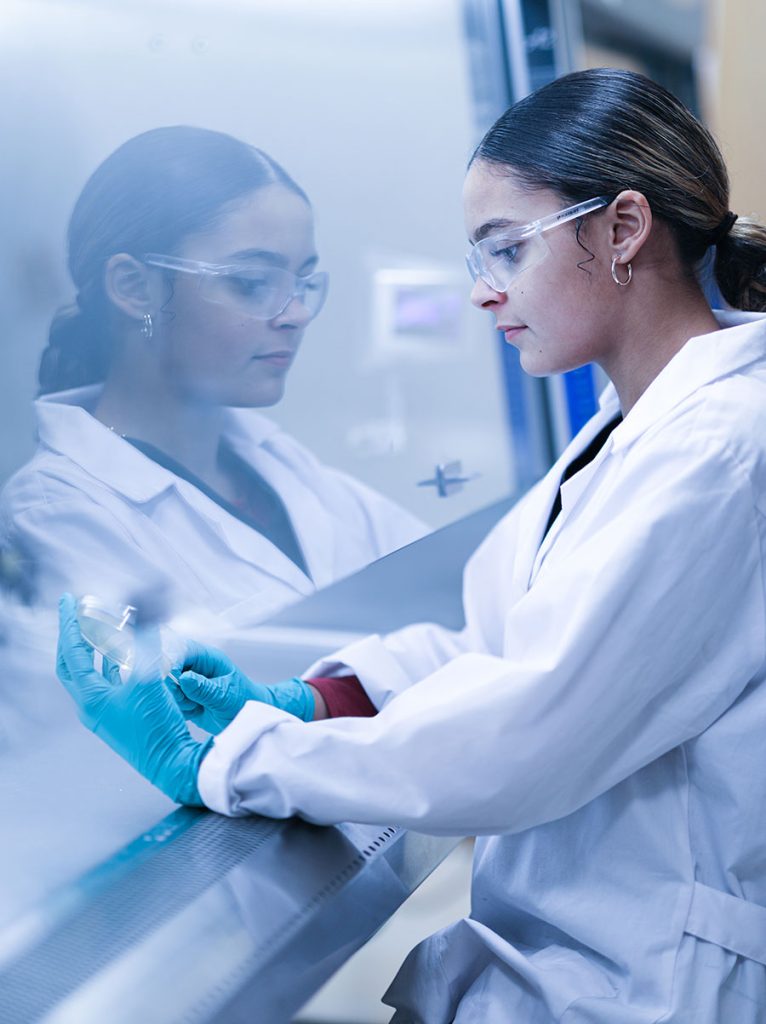Health Sciences Cluster
Biotechnology
About This Program
Biotechnology is the science of using living organisms, their products, or their component parts, for human benefit along with using technical applications that turn biological knowledge into products. Biotechnology is an interdisciplinary field that merges biology, chemistry, mathematics, computer science and engineering. It is also one of the fastest growing commercial industries, with Massachusetts being a major center for growth and innovation. This program provides students with an introduction to biotechnology and offers hands-on experience with the equipment, instrumentation, and techniques frequently used in the field. See below for full course descriptions.

Career Paths
- Laboratory Assistant
- Associate Scientist
- Biomedical Engineering
- Molecular Biology
- Microbiology
- Genetic Engineering
- Immunology
- Research Scientist
- Medicine
- BioInformatics
- Agricultural and Food Science
- Veterinary and Forensic Sciences
Industry Partnerships
- Amgen Biotech Experience
- Cell Signaling Technology
- Endicott College
- The National FFA Organization
- MassBioEd
- SkillsUSA
Certifications
- OSHA 10 Hour Health
- AHA CPR/First-Aid
Advisory Committee Members
- Jacob Alden, Cell Signaling
- Alana Arangio, Sanofi
- Mark Bruso, Massachusetts Biotechnology Education Foundation
- Stephanie Deluca, Charles River Laboratories
- John Delyani, Tmunity
- Frankie Gwynne, Illumina
- Brianne Hantzis, SkyHawk Therapeutics
- Jeff Jacques, Advanced MicroAnalytical/EMSC
- Kalomira Kalaitzis, VWR International Ward’s Science
- Louise Kao
- Jillian Mason, Cell Signaling Technology
- Laura Rubin, North Shore Community College
- Lucy Serverino
- Diane Silva, Novartis Institute of BioMedical Research
- Gene Wong, Endicott College
Meeting Documents
- Biotechnology Fall 2017 PAC Meeting Minutes
- Biotechnology Fall 2018 PAC Meeting Minutes
- Biotechnology Fall 2019 PAC Meeting Minutes
- Biotechnology Fall 2020 PAC Meeting Minutes
- Biotechnology Fall 2022 PAC Meeting Minutes
- Biotechnology Spring 2018 PAC Meeting Minutes
- Biotechnology Spring 2019 PAC Meeting Minutes
- Biotechnology Spring 2021 PAC Meeting Minutes
- Biotechnology Spring 2022 PAC Meeting Minutes

Student Outcomes
Nathaniel Jorgenson, Class of 2018
Where are they now? Student at Rochester Institute of Technology
What is their job title?Lorem ipsum dolor sit amet, consectetuer adipiscing elit. Aenean commodo ligula eget dolor. Aenean massa.
“The education I received in my Biotechnology program at Essex North Shore definitely provided me with a jumpstart to my college experience.”
Meet the Biotechnology Teachers

Ms. Arlyssa LaPorte
Biotechnology Teacher
[email protected]

Ms. Debora O’Reilly
Biotechnology Teacher
[email protected]
Biotechnology Course Descriptions
| Course Number | Name | Credit | Grade Level |
|---|---|---|---|
| bt101 | Biotechnology Exploratory 9 | 1.0 | Grade 9 |
| bt103 | Biotechnology 9 | 10.0 | Grade 9 |
| bt200 | Biotechnology 10 | 20.0 | Grade 10 |
| bt300 | Biotechnology 11 | 20.0 | Grade 11 |
| bt301 | DNA, RNA, and Proteins 11 | 4.0 | Grade 11 |
| bt305 | Biotechnology Cooperative Education 11 | 12.0 | Grade 11 |
| phs301 | CTE Pathway: Communication for Health Professionals | 2.0 | Grade 11 |
| phs302 | CTE Pathway: Medical Forensics | 2.0 | Grade 11 |
| bt400 | Biotechnology 12 | 20.0 | Grade 12 |
| bt401 | Computer Programming 12 | 4.0 | Grade 12 |
| bt405 | Biotechnology Cooperative Education 12 | 24.0 | Grade 12 |
| phs401 | CTE Pathway: Data Analysis in Health Sciences | 4.0 | Grade 12 |
Biotechnology Exploratory 9
Course # bt101 | Credit: 1
This five-day cycle exploratory course introduces grade 9 students to the Biotechnology Career Area. Students will learn about the scientific method, detection methods for whether a substance is an acid or base, chromatography separation techniques based on properties of polarity, aseptic technique for Luria Broth (LB) Agar plates, growing bacteria, using a pipette to measure small volumes and to load samples on a gel, and finally examining DNA fingerprinting to determine the identify of a whale pup’s father. Students will also maintain proper documentation by keeping a laboratory notebook and learn about safety and important equipment used in the lab every day.
Biotechnology 9
Course # bt103 | Credits: 10
This semester-based course provides a proposed scope and sequence for the first half of a 3.5 year Biotechnology career and technical education (CTE). It is designed to explore the field of biotechnology through academically rigorous lessons and intensive hands-on laboratory experience. Students will be introduced to the careers possible in the field of biotechnology. Students will learn the importance of proper documentation in the laboratory. The topics covered will include: Lab safety and regulation, scientific inquiry, calculation, units and measurement; basic microbiology, introduction to DNA and DNA purification, and common laboratory techniques such as pipetting, chromatography and gel electrophoresis.
Biotechnology 10
Course # bt200 | Credits: 20
This full-year course provides students with the basic background knowledge and skills needed to work in a biotechnology lab setting. Students will learn about laboratory safety, and good laboratory and documentation practices. Topics of instruction and hands-on work include: measuring of mass, volume, pH, use of a spectrophotometer to determine analyte concentration, preparation of solutions and media at desired concentrations, Bradford Assay, ELISA assay, factors influencing enzyme activity, aseptic technique, inoculation and growth of cultures of microorganisms, gram staining, use of light microscopes, separation techniques, including gel electrophoresis, size exclusion chromatography, centrifugation, DNA extraction, and the use of recombinant DNA tools such as restriction enzymes. Instruction will be a combination of presentations, demonstrations, and hands-on learning in the laboratory.
Biotechnology 11
Course # bt300 | Credits: 20
This full-year intermediate course will provide students with the practical application of skillsneeded to work in a biotechnology lab or company setting. Students will learn recombinant DNA techniques, polymerase chain reaction (PCR), genotyping, cell culture, and genetic engineering. Topics of instruction and hands on work will include: the use of recombinant DNA tools and methods such as plasmid vectors, restriction digests, ligation, transformation, DNA fingerprinting, DNA profiling, Southern blot, Western blot, aseptic technique in a laminar flow hood, cell culture of animal cells, freezing of cell stocks, determining cell density and percent viability, PCR amplification for species identification and detection, and genotyping. Long-term projects will include the study of plant genetics, maintaining CHOK1 cells in culture, and engineering of bacteria to produce and extract fluorescent proteins. Student learning will take place through a combination of presentations, demonstrations, and hands-on labs and projects.
DNA, RNA, and Proteins 11
Course # bt301 | Credits: 4
This full-year, classroom-based course will use models and graphics to help students understand explanations of: how genetic information is stored in DNA, how DNA is replicated, and how genetic information from DNA is used to create new proteins. Students will learn about the use and development of primers to study genes and to test for the presence of mutations. DNA sequencing methods will also be explored.
Biotechnology Cooperative Education 11
Course # bt305 | Credits: 12
This semester-based course will provide qualified students with a career technical employment opportunity. The program is designed to allow students on-the-job training by involving them in work that is directly related to their technical area of study. Cooperating employers will provide additional training, pay students, and report their performance to the school for every cycle. Please note that juniors are eligible for Cooperative Education during third and fourth quarters only.
Biotechnology 12
Course # bt400 | Credits: 20
This full-year course will continue to help students reinforce and practice the skills learned through previous years in Biotechnology. Major units of study will include: DNA sequencing, CRISPR (clustered regularly interspaced short palindromic repeats) using the Cas9 (CRISPR-associated protein 9) system, plant cloning, designing primers, and participating in a semester-based research project. Students will be encouraged to take on a Cooperative Education placement during this time. Students will continue to work on becoming proficient in such skills as PCR, DNA sequencing, and DNA quantification. Students will also work on long-term, research-based projects.
Computer Programming 12
Course # bt401 | Credits: 4
This full-year, classroom-based course will introduce students to the basics of computer programming, a skill useful in the field of Biotechnology for data analysis and modeling. Students will learn to create computer programs in Python, a popular language in both industry and academia, and one that is easily transferable to other languages. Students will create their own programs to solve complex problems, or to speed up tedious processes. An emphasis will be placed on creating programs for modeling biological systems, or analyzing data gathered in the Biotechnology program.
Biotechnology Cooperative Education 12
Course # bt405 | Credits: 24
This full-year course provides qualified students with a career technical employment opportunity. The program is designed to allow students on-the-job training by involving them in work that is directly related to their technical area of study. Cooperating employers provide additional training, pays students, and reports their performance to the school for every cycle.




